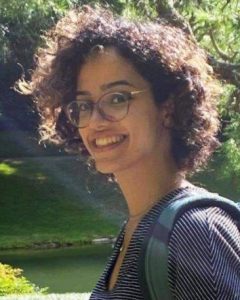Congratulations to Julia Dahlby and Niloufar Benam for being awarded the Canada Graduate Scholarships-Master’s (CGS-M)! The CGS-M is awarded to high-calibre scholars to help develop their research skills and assists in the training of highly qualified personnel. As recipients of this award administered by CIHR, Julia and Niloufar have the opportunity to fully concentrate on their Master’s studies.
 Julia Dahlby
Julia Dahlby
Julia is an MSc student supervised by Dr. Lara Boyd in the Brain Behaviour Lab. This lab examines how the human brain recovers from various types of injury and illness through a variety of methods including motor testing, neural imaging, and cognitive testing.
Julia’s research focuses on examining the relationship between pre-stroke hand grip strength, stroke severity, and sex using data from the UK Biobank. The study’s findings could be used to prescribe preventative interventions and enable better outcomes for Canadian women with stroke.
Outside of academia, Julia works as a physiotherapist at Tall Tree on Commercial Drive treating patients with various musculoskeletal conditions. In her personal time, Julia can be found in the outdoors either skiing or climbing, or at home relaxing and painting.

Niloufar Benam
Niloufar is an MSc student supervised by Dr. Julia Schmidt in the Collaborative Evidence: Developing Awareness and Research (CEDAR) Brain Injury Lab. This lab focuses on Traumatic Brain Injury (TBI) and its effects on individuals’ daily lives. There is a diverse range of research being completed at the CEDAR lab. Some include qualitative studies focusing on the experience of individuals and changes in their self-identity and self-awareness after TBI. There are also projects exploring different rehabilitation methods using virtual reality technology to improve outcomes after TBI.
Niloufar’s research focuses on brain activation patterns after TBI using functional near infra-red spectroscopy (fNIRS). This project aims to understand differences between brain activation patterns between individuals with TBI and healthy controls when completing an everyday activity like getting dressed. The portability of fNIRS allows for brain activation patterns to be studied during real-life tasks of dressing in the unconstrained and natural state as opposed to in neuroimaging tools such as fMRI that require individuals to remain in a supine position during imaging. +
When not working on projects in the lab, you can catch Niloufar painting, playing some ukulele, singing, and baking or cooking different types of cuisines. You might also find Niloufar wandering around the city on extra-long walks!
View all of our funding opportunities.